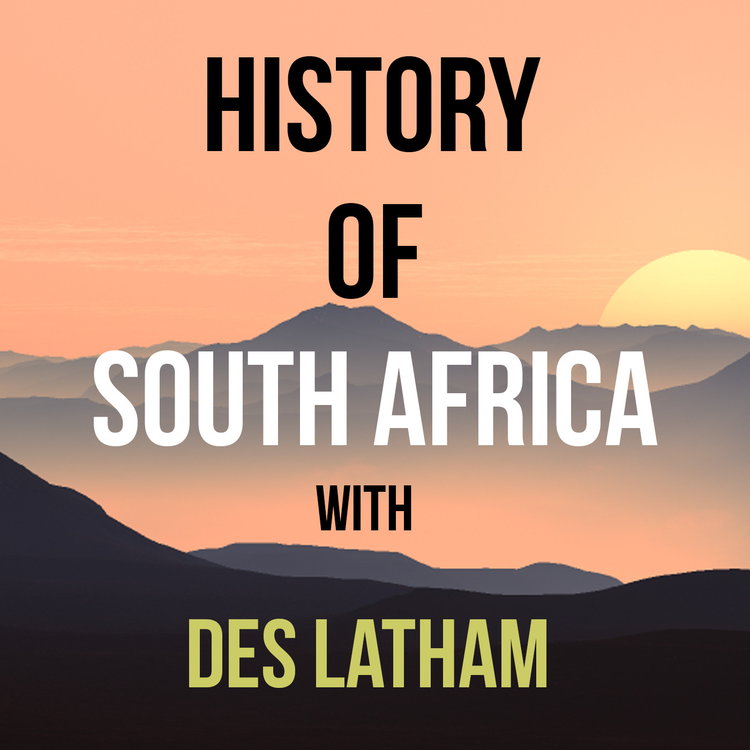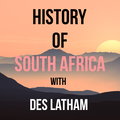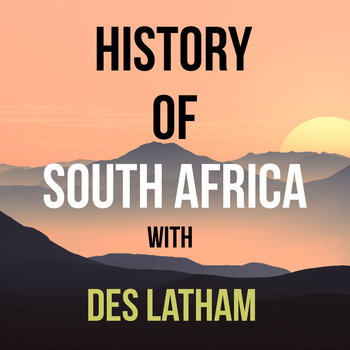
Episode 130 - Piet Uys’ 1820 Settler Bible and the Qadi cut poles
Loading player...
This is episode 130 and the Voortrekkers are moving inexorably towards Natal, where the Zulu king Dingana awaits.
At about the same time and as you’ll hear next episode, a large Voortrekker commando of more than 360 Boers, Griqua and the Rolong warriors were going to gather with the intent of finishing off Mzilikazi Khumalo. The amaNdebele king had arrived back at Mosega in the Klein Marico valley, and had also just fended off an impi sent by Dingana.
By now, the number of trekkers arriving at Thaba ‘Nchu area had increased to a few thousand, including a large party under Pieter Jacobs that had left the Beaufort West district.
These were the remnants of the Slagter’s Nek rebellion, they were relatives of the Boers who’d been hanged 22 years earlier. I covered the Slagter’s Nek rebellion in episode 74, the bitter resentment about what the British had done had never been forgotten nor forgiven.
And here was the result, dozens of families from Beaufort West and elsewhere, determined to escape the might of the British Empire in their little wagons, determined to seek freedom on the expansive veld, the deep African hinterland with all its mysteries and excitement.
There was also Jacob de Klerk who’d left the Baviaan’s River district - 62 families in 30 wagons. Another important group were the 100 trekkers led by 72 year-old Jacobus Johannes Uys which had departed from the Uitenghage district in March 1837.
The real leader of this group, however, was his son, Piet Uys. He’d befrended Louis Trichardt a few years before - and was called dynamic — energetic — charismatic. Uys had also visited Dingana two years before to sound out the Zulu king’s views on possibly granting land to the trekkers in Natal.
Uys was well liked in the eastern Cape — and when he arrived in Grahamstown en route to the hinterland, a deputation of 1820 British settlers turned up to present him with a huge Bible bound in leather from Russia and inscribed with a stirring message that God would guide the Voortrekkers because the Volk had faith.
By April 1837, Dingana was even more troubled by the Qadi people and specifically, their chief Dube kaSilwane. They inhabited a small territory to the north of the Tugela in the vicinity of where Kranskop is today. Dube was often referred to a peace-loving, but some say this was post ipso facto because a lot of men killed by Dingana were characterised as peace-loving.
But just to explain further, Zulu oral history says that Dingana had Dube killed for no other reason than he excelled during a dancing competition in which the Zulu king was participating.
Very ancient rule there. If you have a dancing king, don’t show off and make him look like an amateur. Bad career move.
Uvezi, uNonyanda Mgabadeli goes the most famous izibongo zikaDingana, — Vezi Nonyanda, Mgabadeli means the Prancer and this is how the entire 430 line poem about Dingana starts.
At about the same time and as you’ll hear next episode, a large Voortrekker commando of more than 360 Boers, Griqua and the Rolong warriors were going to gather with the intent of finishing off Mzilikazi Khumalo. The amaNdebele king had arrived back at Mosega in the Klein Marico valley, and had also just fended off an impi sent by Dingana.
By now, the number of trekkers arriving at Thaba ‘Nchu area had increased to a few thousand, including a large party under Pieter Jacobs that had left the Beaufort West district.
These were the remnants of the Slagter’s Nek rebellion, they were relatives of the Boers who’d been hanged 22 years earlier. I covered the Slagter’s Nek rebellion in episode 74, the bitter resentment about what the British had done had never been forgotten nor forgiven.
And here was the result, dozens of families from Beaufort West and elsewhere, determined to escape the might of the British Empire in their little wagons, determined to seek freedom on the expansive veld, the deep African hinterland with all its mysteries and excitement.
There was also Jacob de Klerk who’d left the Baviaan’s River district - 62 families in 30 wagons. Another important group were the 100 trekkers led by 72 year-old Jacobus Johannes Uys which had departed from the Uitenghage district in March 1837.
The real leader of this group, however, was his son, Piet Uys. He’d befrended Louis Trichardt a few years before - and was called dynamic — energetic — charismatic. Uys had also visited Dingana two years before to sound out the Zulu king’s views on possibly granting land to the trekkers in Natal.
Uys was well liked in the eastern Cape — and when he arrived in Grahamstown en route to the hinterland, a deputation of 1820 British settlers turned up to present him with a huge Bible bound in leather from Russia and inscribed with a stirring message that God would guide the Voortrekkers because the Volk had faith.
By April 1837, Dingana was even more troubled by the Qadi people and specifically, their chief Dube kaSilwane. They inhabited a small territory to the north of the Tugela in the vicinity of where Kranskop is today. Dube was often referred to a peace-loving, but some say this was post ipso facto because a lot of men killed by Dingana were characterised as peace-loving.
But just to explain further, Zulu oral history says that Dingana had Dube killed for no other reason than he excelled during a dancing competition in which the Zulu king was participating.
Very ancient rule there. If you have a dancing king, don’t show off and make him look like an amateur. Bad career move.
Uvezi, uNonyanda Mgabadeli goes the most famous izibongo zikaDingana, — Vezi Nonyanda, Mgabadeli means the Prancer and this is how the entire 430 line poem about Dingana starts.

